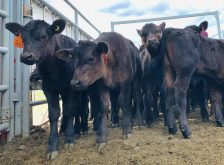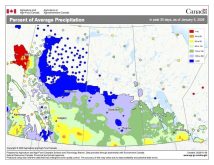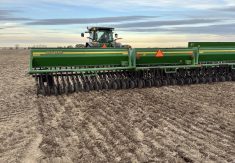Allen Oberg
CWB director candidate for Alberta Zone # 5
We are now in the midst of another round of Canadian Wheat Board (CWB) director elections, which is an integral part of the democratic process that has occurred every two years since control of the CWB was given to farmers in 1998. It has often been said that these elections are, in fact, a referendum on the single desk, given that in almost all cases candidates on both sides of the issue clearly state their positions and farmers can decide the future direction of their marketing agency.
Read Also

Taking the farmers’ market online
Two Albertans, who have a cow-calf operation near McRae, had the idea to create Arvo, an online farmers’ market, after being unable to find beef from within their own community.
However, in this 2010 election, I am noting a somewhat different and disturbing trend in that some candidates seem to be reluctant to state their views on whether they support retention of the CWB’s single desk mandate. In fact in some biographies, the term ‘single desk’ does not appear nor is it stated in any other way. I can only conclude that this was either an oversight on their part or that they feel the legislated mandate of the board to be a minor issue.
A minor issue? I hardly think so. The CWB’s single-desk authority allows it to be the only single seller of Canadian wheat and barley, giving it a tremendous advantage in the marketplace and earning substantial premiums, which are returned directly to farmers. It is also the reason our foreign competitors would like to see it dismantled as they would have the most to gain from its demise. But the single desk is much more than that.
Using the strength of the single desk allows the CWB to take a long-term view of market development and to brand Canadian wheat and barley as the best in the world. It also allows the CWB to speak effectively on behalf of farmers, whether on transportation costs, the ability to load producer cars, or on quality issues that would negatively affect farmers. Farmers’ right to decide the future of their marketing system needs to be protected at WTO talks. This decision must be made by Canadian farmers, not by our competitors.
And finally, the CWB uses its size and scope to reduce supply chain costs for farmers through the use of their own hopper cars, and by tendering and commercial agreements with the railways and the private trade. Last year alone, these initiatives saved farmers $45.5 million.
Now, we have some real-life examples that illustrate what happens when a single desk mandate is lost. The Australian Wheat Board, even with its considerable assets, is now nearly in the hands of multinational companies in the short space of two years. In Ontario, since deciding to go voluntary some years ago, their wheat board is now only handling a fraction of the grain it once did. A voluntary CWB would share a similar fate in that the grain companies, who are now its agents, would become its direct competitors, with the CWB completely reliant on the use of their systems to execute sales.
So the question for farmers in this election is: Do you want a farmer-controlled organization or do you want an open system?
There is not much middle ground here there are some who like to suggest you can have a CWB just for those who want it while others can go their own way. But unfortunately, that is simply not possible. Farmers need to be aware of the views candidates hold on the value of the single desk this is by far the most important aspect in the structure and effectiveness of the CWB. They need to know not only who they are voting for, but also what all candidates stand for and support. Farmers deserve nothing less.
Allen Oberg has been a full time farmer since 1980 running a grain and cattle operation at Forestburg, Alta. His involvement in the grain industry spans more than 30 years. He was an employee, then delegate and director of the Alberta Wheat Pool, chair of the Western Grain Research Foundation, and was elected to the CWB in 2002. Allen has recently chaired the Farmer Relations Committee and in June 2010 was elected chairman of the CWB board. He has also worked on behalf of farmers in Ottawa on numerous agricultural issues.
Brett Meinert
CWB director candidate for Alberta zone # 3
A director has the responsibility to represent the views of those who elected him to direct. He is also legally obliged to act in the best interests of the corporation. In this case, the interests of the Canadian Wheat Board (CWB) and the interests of the farmers who sell grain through the CWB are the same.
If you read my bio which accompanies your ballot, you will see that I am well qualified to act as director. The term of this election is four years and issues will have changed substantially, at least in form, over that period of time. Therefore, I would like to tell you how I will approach my responsibilities should you elect me director for District #3.
I have stated that I am a builder. To me, this means helping the CWB to evolve to better serve you, its stakeholders. My approach would be to try to make the CWB more user-friendly. The CWB does not need to be strengthened, to become all-powerful as some would have you believe. Neither should it be destroyed to gratify the small group of individuals that are ideologically opposed to its very existence. Mechanisms such as the various producer payment options or the producer buy-backs for individual sale can be strengthened to improve service to all. The CWB can evolve to accommodate all but the most extreme viewpoints.
My approach has always been non-partisan. I believe that anyone sitting on the other side of the table from me, whether politically left or right, will feel comfortable. The most acceptable, longest lasting deals are always found when both parties feel they have been treated fairly. My influence will work toward this result, whether I am dealing directly with business partners or dealing indirectly through our CWB employees.
I believe the expertise in pricing, selling, and otherwise managing grain flow from local elevators to overseas destinations exists in the employees of the CWB. They have gone through rigorous hiring procedures testing their skills and education, and are up to the job of serving our farmers and our markets. I refuse ever to undermine the efforts they exert on behalf of Western Canadian farmers. They require guidance only through the CEO and General Manager positions to translate board policy into action in the countryside and overseas.
I have always been willing to take personal risks to make a business run well. Being on the leading edge of the creation of the Saskatchewan Soil Conservation Association, and on the leading edge of the formation of the Saskatchewan Mustard Development Commission demonstrates that I am willing to “do what it takes” to have a positive outcome. My global viewpoint and commonsense are demonstrated by my actions in those two organizations, as well as by the success I helped to create as a board member for South West Terminal Ltd.
My ability to see and act within the big picture is demonstrated by the part I played in encouraging South West Terminal to invest in Lethbridge Inland Terminal. My ability to work with others in a boardroom environment is demonstrated by all of these examples, as well as my role in the evolution of the Inland Terminal Association of Canada as its chairman for three years.
I have the skills, the education, and the commitment to agriculture to best serve you and the CWB over the next four years as director, District #3. Consider L. Brett Meinert when you mark your ballot.
Brian Otto
CWB Director Candidate in Alberta District # 3
I believe the Canadian Wheat Board (CWB) needs to be more responsive to farmers’ needs and more business oriented. That is the only way the CWB will broaden its support among farmers and move forward as an organization.
The 2010 CWB Farmer Survey shows wheat and barley producers see a problem with the lack of markets for their grain. The survey shows that 48 per cent of wheat growers and only 34 per cent of barley growers prefer only the CWB to market their crops. More troubling, only 23 per cent of farmers under the age of 45 (our future) strongly support the CWB single desk.
Most farmers agree that the CWB does some things well, such as branding western Canadian wheat and barley. These areas are strategic to western Canadian farmers to differentiate western Canadian wheat and barley from our competitors. I want to see the CWB continue with market development and stop its political rhetoric.
My two main priorities as a director would be to:
Improve the responsiveness of the CWB, and;
Increase the business focus of the CWB.
In terms of responsiveness, one of the main issues I hear from farmers is the lack of flexibility on board grains. This is severely impacting farmers’ ability to manage their business. Cash flow is a critical issue, particularly for younger farmers. To address this, I strongly advocate for more flexibility and certainty in the delivery and pricing of board grains.
Specific concerns I am hearing include:
Lack of delivery opportunities for durum. Farmers with cash advances were not allowed to deliver to repay their cash advances on durum.
The decision by the CWB to withdraw from the durum market in the 2008/2009 crop year resulted in serious financial losses to durum producers.
The “Guaranteed Price Contracts” (GPCs) for feed barley lack transparent price signals.
Overall communications on programs, delivery and pricing options need improvement. Farmers feel they miss programs; they need more timely communications.
As a CWB director, I would never vote for the CWB to withdraw from a market without it first consulting with farmers. The CWB needs to respect the fact that it is the farmers’ business and it exists to “put farmers first.”
In terms of increasing the business focus of the CWB, I want to see improvements in risk management and operating efficiencies. The losses producers have suffered due to CWB market exposure and the lack of appropriate risk management have been very significant, literally in the hundreds of million dollars. Decisions on funds flowing into the Contingency Fund by the board appear arbitrary and do not equate directly to managing risk – which is why it was established. This needs to change, and I will propose a strategic review of the Contingency Fund strategy.
I am concerned about the rising costs of running the CWB. The 2008-09 annual report shows costs of $78.7 million or $3.39/tonne. With wheat yields ranging from one to two tonnes per acre on dry-land to irrigation, it means farmers pay from $3.39-to $6.78-per-acre. On a quarter of land that is $542 to $1,080. These costs are growing rapidly. As your director, I will advocate for a full costing review. I feel better accountability needs to be shown to farmers.
Finally the board’s No. 1 priority must be to get the highest possible prices for farmers while maintaining or increasing market share for western Canadian wheat and barley in international markets. Nothing is more important to farmers, and I am concerned that Western Canada’s share of international markets has declined significantly over the last decade while competitors such as the U. S. and Australia have either maintained or grown their shares. If the CWB wants to make a difference for farmers, this trend must be reversed.
Producers have my assurance that I will listen to their needs and represent them at the board table to the best of my ability. I will listen first and then try to bring about change that is constructive and positive. I believe in transparency and openness with farmers. I will avoid all the rhetoric that farmers are so tired of hearing.
I am open to change but only if it makes sense and helps farmers. As a director I will bring new ideas to the table, I will offer new leadership and above all I will “put farmers first.”
Dan Gauthier
CWB director candidate for Alberta zone # 1
Dan Gauthier of Donnelly, Alberta, strongly supports the Canadian Wheat Board (CWB) single desk. He knows that when farmers work together, they have more control over marketing and transportation. As a result, they get better prices and reduce their risks. The CWB provides a united voice for farmers. That’s why Dan is seeking election to the CWB board of directors as your representative in District 1.
Dan is a farmer whose roots run deep in the Peace country. When he began farming in 1984 on the third-generation Gauthier family farm in the MD of Smoky River, he was 19 years old. Now married, he and his wife Rhonda have two teenage sons: Ryan (16) and Brett (14). Rhonda and Dan farm in partnership with Dan’s brother Victor and sister-in-law Anchalee. Together, they crop 5,400 acres of wheat, canola, oats and peas.
To better understand what concerns producers have in District 1, Dan began travelling on October 17th and meeting with producers to gain an insight into what they want the Canadian Wheat Board to be. His travels started in the Edmonton region: Legal, Morinville, Waskatenau, Thorhild, Westlock, and Barrhead. Then he made his way up to Nampa and Grimshaw. Then on over to the Peace District of British Columbia: Dawson Creek, Farmington, Fort St. John and over to the Beaverlodge and Hythe area in Alberta. The next area was Manning, Hawk Hills, Keg River and up to LaCrete, Fort Vermillion and High Level, and then to Sexsmith, Girouxville, High Prairie and Athabasca. The common comments Dan has heard are:
-Keep the strong single desk.
-Enhance PPOs and make them easier to understand.
-Protect the producer cars.
-One farmer, one vote.
When you vote for Dan Gauthier, you are getting a producer representative who cares about producers’ concerns. Dan will bring your concerns forward to the board meetings and work for efficiency, increased value and improved grain movements. When you send Dan to Winnipeg, rather than waste time with trying to manipulate the voter list, he would rather fix the problem we have with the board of directors.
At the moment, we have 10 producer-elected directors and five government-appointed directors. The problem with this is the government doesn’t need to necessarily appoint useful directors, they can appoint directors that are there just to cause a disturbance to the flow of board meetings. What Dan would like to pursue as a change is to have the government supply a list of prospective directors for these positions and have them ratified by the 10 elected directors.
He would also like to have only the CEO/president have a vote and have the other four appointed directors serve as ex-officio. This would mean the four directors that are appointed would be appointed for their expertise and would not be voting on business that they do not have an active stake in.
This would put the control of the Canadian Wheat Board in the hands of the producers, the people whom this institution was designed to serve.
“I believe we need to gain control of the CWB for the producers,” said Dan. “This change would allow farmers to have the final say in what the CWB is doing or not doing for them.”
Dan will always make himself available to the producers of District 1.
Henry Vos
CWB director candidate for Alberta zone # 1
I’m optimistic about agriculture, it has a great future. We need to encourage young people to be involved and focus on agriculture’s opportunities.”
Originally from Keg River, Alta., Henry graduated from the agriculture program at the University of Alberta, and married Anne Tretiak, a district agriculturalist from Manning. After farming for 10 years in Keg River, they moved to Fairview, where they have farmed for the past 20 years. Their two daughters are now studying agriculture at university.
Up until 2008, their family farm produced pedigreed seed and commercial crops as Peace Pedigreed Seed. Today, the farm produces commercial wheat, barley, canola, oats and forage crops on 2,500 acres.
Henry has been involved in a number of agricultural businesses, including a retail seed and crop protection outlet (ECO Seeds) and co-owning and managing Three Links AgResearch Inc., which conducted small plot trials for new crop varieties and crop protection products. He was also a founding director of Canterra Seeds, and has been a long-time member of Secan Ltd. and the Canadian Seed Growers Association (CSGA).
In addition, Henry has been president of the Alberta Branch of the CSGA, a public governor of the Winnipeg Commodity Exchange and a director and president of the Alberta Canola Producers Association. He has been a director of the Alberta Agricultural Research Institute and a committee member of the Agriculture and Food Council. Henry is currently serving on the Alberta Feed Grain Advisory committee.
Henry is a strong and knowledgeable community contributor and supporter. He served in municipal government for three years, on the Board of Governors for Fairview College for six years, and helped with 4-H clubs for many years. A respected farmer with considerable board experience, Henry believes in giving back to the community and giving back to farmers.
Henry’s vision: “A Canadian Wheat Board where farmers have the freedom to operate and manage their business with relatively few restrictions.”
Past term
During his past term as a director, Henry has worked constructively for change to increase the value of wheat and barley to farmers. In addition to his Board and committee duties, he served as the vice-chairman of the Canadian International Grains Institute (CIGI), which provides important technical marketing expertise for Canadian wheat and barley buyers.
These activities have convinced Henry that the Canadian Wheat Board (CWB) has done well in international market development and branding of Canadian grains. He believes that the CWB has a good relationship with most of its international customers. However, he sees in CWB Producer Surveys and hears from farmers that they want a change in their business relationship with the CWB.
On vision
“Farms and their marketing needs throughout Western Canada are changing. The CWB needs to recognize and respond to these changing needs.”
“In this region and across the prairies, I keep hearing from farmers that they need increased flexibility to manage their farm businesses.”
Henry has a passionate and defined vision for the Canadian Wheat Board. He supports a CWB where farmers have the freedom to operate and manage their businesses with relatively few restrictions.
He supports farmers having these basic freedoms:
The freedom to deliver their wheat and barley as they choose based on storage and interest payments.
The freedom to choose simple and transparent pricing opportunities similar to the open market.
The freedom to manage their cash flow from CWB grains according to their needs.
“These freedoms do not have to come at the ‘sacrifice’ of the CWB,” Henry says.
This view reflects what many farmers want: “I am listening to what producers are saying and am trying to implement these changes.”
On Sustainable Solutions
Henry believes the future sustainability of the CWB is based on meeting three objectives:
1) Profitability of wheat and barley as crop options
The biggest challenge for wheat and barley long term is their lower profitability relative to other crops. This is evidenced by a continual trend downward in acres. “In many cases, farmers are growing wheat and barley as rotational options between more profitable crops, and this must change,” says Henry.
2) Farmer satisfaction
Farmer satisfaction will improve if the CWB listens to farmers and provides the freedom and flexibility they are asking for.
3) Accountability of the organization to farmers
The CWB board of directors must hold management responsible to insure the organization is efficient and accountable.
“I don’t know of any farmer who doesn’t want to see the CWB generate greater profits and add more value,” he says.
Lynn Jacobson
CWB Director Candidate For Alberta Zone # 3
My name is Lynn Jacobson and I believe in a strong Canadian Wheat Board (CWB) that offers marketing options within a single-desk environment. I also believe in a CWB that is controlled by, and accountable to, Western Canadian producers.
My involvement with the CWB through different farm organizations has given me an appreciation of the expertise the board brings in dealing with many of the issues facing Western Canadian producers. The CWB works in unison with many of the producer organizations in Canada, and farmers are stronger for it. The wheat board has expertise and knowledge that no other producer organization or commission has.
While marketing is the board’s primary focus, the CWB engages in other activities such as transportation, market development, and research. These activities are just as important to producers as marketing, and return millions of dollars in benefits. The money that is generated by the activities of the CWB does not always come in the form of a cheque in hand. It may, for example, take the form of a cost saving, a risk-management activity, producer cars, or market development. If the CWB was altered so that it could not fulfill the role it does today, many of the benefits that producers currently enjoy would go to grain companies, railroads, or simply disappear. If the CWB’s mandate is going to change, producers have to ask themselves three questions:
Who would fill the role that the CWB currently performs?
What would the cost be to producers?
Who would benefit from changes to the CWB?
Even opponents of the CWB admit that the board performs valuable services for producers in many areas. Critics of the CWB have never given satisfactory answers to the three questions listed above. Limiting the debate on the future of the CWB to its marketing mandate ignores the many other services the board provides to producers.
The federal government sets the amount of the initial payment, which seems to average 60 per cent of the PRO. At the present time, the federal government will not allow the CWB to make any grain price adjustments without its approval. There have been times the initial payments have not been adjusted in a timely fashion, so if you sold a bushel of grain you could not buy a cup of coffee at Starbucks. The important part is timely price adjustments of the initial payment. I would like the CWB board of directors to have the authority to increase the initial prices. The slow adjustment of interim prices is an unnecessary cost to all producers and harms young farmers the most.
In order to offer producer pricing options, the CWB must have a contingency fund in place. If the current WTO deal is signed by 2013, this fund must grow to cover initial price guarantees and price adjustments. I would like to see the federal government compensate producers for signing away price and borrowing guarantees, and use that money to build an adequate contingency fund.
I would also push for a full costing review of grain transportation costs. The federal government has so far refused to initiate such a review even though it has cost grain producers close to one billion dollars in extra costs over the past five years, and is likely to cost more than a billion in the next five.
Who controls the CWB? In my opinion, the intent of the federal Canadian Wheat Board Act is clear. The CWB is an elected board controlled by producers. The role of the federal government is to be a consultative one, and the appointed directors are to provide expertise in areas the elected board members are lacking. The role of the federal government concerning the CWB has to be clarified and clearly stated in any amendments to the CWB act.
Who can make changes to the mandate of the CWB is also an issue between producers and the federal government. I would only support changes to the mandate of the CWB if they were done by producer plebiscite. This is a vital question that every candidate needs to answer. If they support the position that the mandate of the CWB can be changed by the federal government or by a vote of the board of directors, they do not support single desk marketing and a strong and viable CWB.
After all it should be our voice and our choice to decide the future of the CWB.
I humbly ask for your vote in the District 3 director elections.
Stewart Wells
CWB Director Candidate For Alberta Zone # 3
Q: Just who is Stewart Wells?
I was born and raised on a family farm near Swift Current. In 1989, Terry Toews (my partner in life and farming) moved to the farm, and together we operate a third-generation family farm 15 miles east of Swift Current. I acquired a degree in agricultural engineering from Saskatoon in the mid-1970s.
Our farm consists of 3,500 acres, with 2,300 acres of cultivated land and 1,200 acres of native pasture. Until 1986, a 100-head cow-calf operation was part of our daily life, but now the pasture is rented out. Over the years we have grown spring wheat, durum wheat, winter wheat, barley, peas, lentils, kamut, flax, canola, alfalfa, yellow clover, and chickling vetch. In the last few years, the majority of the acres have been seeded to organic red spring wheat, winter wheat, peas and lentils.
Q: Why support the Canadian Wheat Board (CWB)?
Irrigated or not, southern Alberta can produce some of the best grain in the world whether it’s soft white wheat, durum, winter wheat, red spring wheat, malt barley, or feed barley. Depending on U.S. corn prices, some of this grain can be used in feedlots and ethanol plants. But large amounts will continue to be marketed around the world.
In 2006, I was part of a working group that published a list of questions that farmers should consider when thinking about grain marketing and the CWB. The working group consisted of the major farm organizations from Alberta, Saskatchewan, and Manitoba: WRAP, APAS, SARM, KAP, and the NFU. (The report can be viewed on my websitewww.vote1wellscwb.ca.) This paper is a must read for anyone that truly wants to understand the Canadian Wheat Board.
Q: Why is the single-desk selling advantage important?
With the single-desk selling advantage, farmers are price makers – not price takers. When combined with the other benefits of price pooling and government guarantees, the single desk provides farmers with superior risk management and better returns than would be the case if our only option was the private trade.
We also know that without the single desk the CWB ceases to exist. Just 24 months after the Australian Wheat Board (AWB) lost its single desk, the AWB is being swallowed up by the international grain trade. Losing the single desk did not make the AWB a better marketer, it meant the disappearance of the AWB altogether.
Farmers need to be wary of anyone who talks about a “dual market,” “marketing choice,” “competition,” or will not commit to supporting the single desk. The “dual market/choice/competition” myth is dead, and it has been killed by the example of the AWB.
Secondly, the single desk selling advantage makes nearly all of the other advantages possible. The single desk gives the CWB leverage in transportation and producer car issues. In Alberta, as well as in other parts of the Prairies, more farmers are banding together to start grain-dependent short line railways. Without the CWB to guarantee shipment, the producer car right is meaningless, and these short lines could not be started.
As well, the CWB helps keep rail freight rates down and service levels up because the CWB is a strong ally with expertise and resources. A current example is the farmer push for a rail-costing review. Right now, farmers are paying rail costs based on railway numbers from 1991. That’s ridiculous, and the CWB is working hard alongside the major western farm organizations in calling for a costing review intended to lower freight rates for farmers.
The single desk also enables the CWB to strategically coordinate the blending of grain, inland and at port. These benefits are counted in the millions of dollars in a normal year. This year they could even be higher.
Q: Why vote for Stewart Wells?
I have a lot of experience dealing with the private trade for non-Board grains and the CWB on our own farm. Being a farmer-elected delegate to Saskatchewan Wheat Pool gave me a grounding in the large-scale business side of agriculture. Working with farm organizations and provincial and national committees has given me experience in policy development.
We can improve the board, but only if we build on the solid foundation of its marketing advantages. The CWB is Our Board, Our Business, and we can’t take a chance by electing Board members who don’t support the single desk and will make us “price takers instead of price makers.”
———
This fall, directions are being held for the positions of producer-director in five of the Canadian Wheat Board’s 10 electoral districts in Western Canada. Three of the dictricts – 1, 3 and 5 – are completely or partly in Alberta. Alberta Farmer has offered each of the candidates 750 words to outline their platform. Vicki Dutton of Paynton, Sask., a candidate for District 5, had not responded by press time. Voting packages were mailed to producers Oct. 26 and ballots must be returned by Dec. 3. More information is available atwww.cwbelection.com














